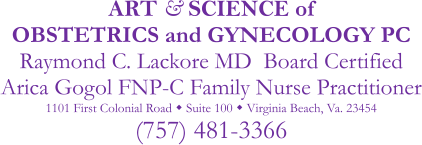Recovery Instructions Laparoscopic Hysterectomy
Print-Friendly PDF – click here
Removing the Uterus and Cervix (Total Laparoscopic Hysterectomy) with or without ovarian removal – is a surgical procedure involving the use of general anesthesia. If you experience any problems after being discharged home, during office hours call 757-481-3366. After 4:30 pm call his night time emergency number 757-455-3584. You will be connected to the Physician on Call. Dr. Lackore’s after-hour coverage is provided by Womancare Center at Sentara Leigh Medical Center. Go to your closest emergency room if you feel you need immediate attention.
The anesthesia will be acting in your body for the next 24 hours, so you will feel a little sleepy – this feeling will slowly wear off. Since the anesthesia (and sometimes medication for pain and nausea) is still in your system, do the following;
NORMAL ACTIVITY – Most patients with this procedure go home in 8 to 23 hours following surgery. Someone must drive you home. Rest and pamper yourself for at least 7 days. You have had major surgery even though it was generally accomplished through three small incisions. The first week you are home take care of just yourself. No heavy work, lifting (over 25 pounds), straining, or long-standing for three weeks. Do not engage in sports, heavy work, or strenuous activity for three weeks. Thereafter gradually return to what is normal for you. Get rest, but remember fresh air and sunshine help speed recovery. So get outside and walk around. You may walk up and downstairs if necessary. However, go slowly, cautiously, and always hold the handrail.
YOU MUST – have an adult with you for 24 hours.
DO NOT – drive a car until you are fully alert, comfortable, off all pain medications, and back to your usual full abilities (wait at LEAST 14 days), longer if you still need pain medications or feel discomfort).
DO NOT – operate hazardous machinery, power tools, or kitchen appliances for 72 hours.
DO NOT – care for small children for 72 hours – it is NOT safe to have this responsibility.
DO NOT – put anything in the vagina for TEN weeks. No Intercourse for 10 weeks.
DO NOT – take a tub bath. Showers are preferred during the first week. Wait until you are comfortable getting up and down.
DO NOT – make any important personal or business decisions or sign any legal documents for 72 hours.
DANGER SIGNS: (call urgent contact phone numbers above).
- SIGNS OF INFECTION: increase in pain, foul odor, severe chills, fever (temperature over 100.5).
- EXCESSIVE BLEEDING: Repeatedly soaking a pad every 15 minutes is not OK – call!
- NAUSEA, VOMITING, DIARRHEA: Severe or more than 24 hours – Call.
- URINARY SYMPTOMS: If you feel persistent urinary burning or pain or if you have not urinated within 12 hours after surgery, call Dr. Lackore.
- PAIN: – this procedure is normally associated with 2-4 days of moderate discomfort. Call if the pain is steadily worsening.
- VAGINAL DISCHARGE – this procedure is commonly associated with a light bloody or very dark brownish discharge for 2-5 days. Do not let this alarm you as it is normal and expected.
- CARE OF THE INCISION: Skin glue may have been used, DO NOT PICK OR SCRATCH AT THE SKIN GLUE! Incisions heal gradually. When you bathe, gently cleanse the incision with soap and water. You may let the shower wash down directly on the incision and pat it dry afterward with a clean towel.
- Any other serious questions or concerns that things may not be going well.
DIET:
- Begin with clear liquids for an hour (7-Up, ginger ale, Sprite, tea, apple juice – anything you can see through). Next, you may progress to Jell-O, chicken noodle soup, and crackers. By evening, you may have a light meal if you wish.
- Avoid spicy, fried, or “heavy” foods and dairy products for 24 hours (no pizza or hamburgers).
- No alcoholic beverages, including beer and wine, for 24 hours and while taking pain medications or antibiotics.
- Resume your regular diet as tolerated.
NEW PRESCRIPTIONS: You may take Tylenol or Aleve (at normal doses on the bottle) as your wish for discomfort.
PRESCRIPTION MEDICATIONS: Take medications as prescribed by your physician.
- Take pain medications (only as needed) with food or milk.
- Review pamphlet supplied by the pharmacy where your prescription was filled.
- Call your surgeon or pharmacy if you do not understand your new medications.
POSTOPERATIVE VISIT: this visit is usually scheduled before surgery. If not, please call the office at 481-3366 and make an appointment for your post-operative check-up 10-15 days following the procedure.
by Raymond C. Lackore MD

